-
(单词翻译:双击或拖选)
Part 1 The Origin of Halloween 万圣节的由来 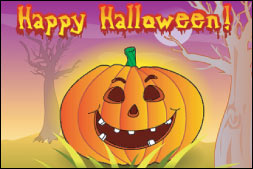
Halloween is an annual celebration, but just what is it actually a celebration of? And how did this peculiar1 custom originate? Is it, as some claim, a kind of demon2 worship? Or is it just a harmless vestige3 of some ancient pagan ritual?
Halloween is one of the oldest holidays with origins going back thousands of years. The holiday we know as Halloween has had many influences from many cultures over the centuries. From the Roman's Pomona Day, to the Celtic festival of Samhain, to the Christian4 holidays of All Saints and All Souls Days.
Hundreds of years ago in what is now Great Britain and Northern France, lived the Celts. The Celts worshipped nature and had many gods, with the sun god as their favorite. It was "he" who commanded their work and their rest times, and who made the earth beautiful and the crops grow.
The word itself, "Halloween," actually has its origins in the Catholic Church. It comes from a contracted corruption5 of All Hallows Eve. November 1, "All Hollows Day" (or "All Saints Day"), is a Catholic day of observance in honor of saints. But, in the 5th century BC, in Celtic Ireland, summer officially ended on October 31. The holiday was called Samhain (sow-en), the Celtic New year.
One story says that, on that day, the disembodied spirits of all those who had died throughout the preceding year would come back in search of living bodies to possess for the next year. It was believed to be their only hope for the afterlife. The Celts believed all laws of space and time were suspended during this time, allowing the spirit world to intermingle with the living.
Naturally, the still-living did not want to be possessed6. So on the night of October 31, villagers would extinguish the fires in their homes, to make them cold and undesirable7. They would then dress up in all manner of ghoulish costumes and noisily paraded around the neighborhood, being as destructive as possible in order to frighten away spirits looking for bodies to possess.
Probably a better explanation of why the Celts extinguished their fires was not to discourage spirit possession, but so that all the Celtic tribes could relight their fires from a common source, the Druidic fire that was kept burning in the Middle of Ireland, at Usinach.
Some accounts tell of how the Celts would burn someone at the stake who was thought to have already been possessed, as sort of a lesson to the spirits. Other accounts of Celtic history debunk8 these stories as myth.
The Romans adopted the Celtic practices as their own. But in the first century AD, Samhain was assimilated into celebrations of some of the other Roman traditions that took place in October, such as their day to honor Pomona, the Roman goddess of fruit and trees. The symbol of Pomona is the apple, which might explain the origin of our modern tradition of bobbing for apples on Halloween.
The thrust of the practices also changed over time to become more ritualized. As belief in spirit possession waned9, the practice of dressing10 up like hobgoblins, ghosts, and witches took on a more ceremonial role.
关于万圣节由来的,传说最多的版本认为,那是源于基督诞生前的古西欧国家,主要包括爱尔兰、苏格兰和威尔士。这几处的古西欧人叫德鲁伊特人。德鲁伊特的新年在十一月一日,新年前夜,德鲁伊特人让年轻人集队 ,戴着各种怪异面具,拎着刻好的萝卜灯,他们游走于村落间。
,戴着各种怪异面具,拎着刻好的萝卜灯,他们游走于村落间。
这里要说明一下,南瓜灯是后期习俗,因为古西欧最早没有南瓜。这在当时实则为一种秋收的庆典;也有说是“鬼节”,传说当年死去的人,灵魂会在万圣节的前夜造访人世,据说人们应该让造访的鬼魂看到圆满的收成并对鬼魂呈现出丰盛的款待。所有篝火及灯火,一来为了吓走鬼魂,同时也为鬼魂照亮路线,引导其回归。
在中世纪的中欧,曾有过基督教摧毁异教徒的历史。可是新年夜前的祭祀庆典从未真正消除,不过以巫术的形式出现。这也就是为什么我们现在的万圣节里,还留有巫婆的扫帚、黑猫、咒语等痕迹。下面再说说Halloween一词的产生:很多民族都在万圣节前夜有庆典聚会,这又被叫做“All Hallow E'en”、“The Eve of All Hallows”、“Hallow e'en”,或者“The eve of All Saintas' Day”。最终约定俗成演变成了“Halloween”,中文意译成了万圣节之夜。
Part 2 Halloween Customs 万圣节习俗
The custom of Halloween was brought to America in the 1840's by Irish immigrants fleeing their country's potato famine. At that time, the favorite pranks11 in New England included tipping over outhouses and unhingin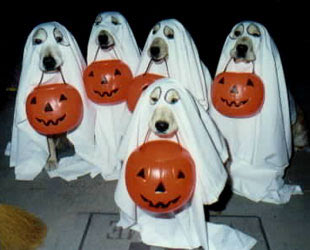 g fence gates.
g fence gates.
The Halloween we celebrate today includes all of these influences, Pomona Day's apples, nuts, and harvest, the Festival of Samhain's black cats, magic, evil spirits and death, and the ghosts, skeletons and skulls12 from All Saint's Day and All Soul's Day.
The custom of trick-or-treating is thought to have originated not with the Irish Celts, but with a ninth-century European custom called souling. On November 2, All Souls Day, early Christians13 would walk from village to village begging for "soul cakes," made out of square pieces of bread with currants. A: The more soul cakes the beggars would receive, the more prayers they would promise to say on behalf of the dead relatives of the donors14. At the time, it was believed that the dead remained in limbo15 for a time after death, and that prayer, even by strangers, could expedite a soul's passage to heaven.
The Jack16-o-lantern custom probably comes from Irish folklore17. As the tale is told, a man named Jack, who was notorious as a drunkard and trickster, tricked Satan into climbing a tree. Jack then carved an image of a cross in the tree's trunk, trapping the devil up the tree. Jack made a deal with the devil that, if he would never tempt18 him again, he would promise to let him down the tree.
According to the folk tale, after Jack died, he was denied entrance to Heaven because of his evil ways, but he was also denied access to Hell because he had tricked the devil. Instead, the devil gave him a single ember to light his way through the frigid19 darkness. The ember was placed inside a hollowed-out turnip20 to keep it glowing longer.
The Irish used turnips21 as their "Jack's lanterns" originally. But when the immigrants came to America, they found that pumpkins23 were far more plentiful24 than turnips. So the Jack-O-Lantern in America was a hollowed-out pumpkin22, lit with an ember.
So, although some cults25 may have adopted Halloween as their favorite "holiday," the day itself did not grow out of evil practices. It grew out of the rituals of Celts celebrating a new year, and out of Medieval prayer rituals of Europeans. And today, even many churches have Halloween parties or pumpkin carving26 events for the kids. After all, the day itself is only as evil as one cares to make it.
孩子们今天着装挨家要糖的习俗,也就是我们所说的Trick or Treat,据说起源于爱尔兰。古西欧时候的爱尔兰异教徒们,相信在万圣节前夜
鬼魂会群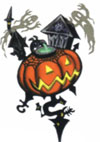 集于居家附近,并接受设宴款待。因而,在“宴会”结束后,村民们就自己扮成鬼魂精灵,游走村外,引导鬼魂离开,避邪免灾。于此同时,村民们也都注意在屋前院后的摆布些水果及其他食品,喂足鬼魂而不至于让它们伤害人类和动物或者掠夺其他收成。后来这习俗一直延续下来,就成了孩子们开的玩笑。
集于居家附近,并接受设宴款待。因而,在“宴会”结束后,村民们就自己扮成鬼魂精灵,游走村外,引导鬼魂离开,避邪免灾。于此同时,村民们也都注意在屋前院后的摆布些水果及其他食品,喂足鬼魂而不至于让它们伤害人类和动物或者掠夺其他收成。后来这习俗一直延续下来,就成了孩子们开的玩笑。
至于南瓜灯,Jack-o-lantern,也有一个传说,吝啬的爱尔兰酒鬼JACK骗魔鬼爬进了苹果树的树洞,然后迅速在树干上刻了一个神圣的十字,困住了魔鬼。JACK逼着魔鬼起誓永远不再追索、或以任何其它方式谋取他的灵魂,才把魔鬼放了出来。然而这却挡不住死亡的来临。JACK死后,由于酗酒、吝啬和欺诈,他未被允许进入天堂。而由于魔鬼的誓言,JACK也不能进入地狱。“那么我去哪里呢?”JACK不知所措地问。“哪儿来的回哪儿去!”魔鬼恶狠狠地回答。回去的路冷风四起,黑暗无边。魔鬼从地狱之火拣了一块烧得通红的火炭扔给他。为了照路又不被风吹灭,JACK将火炭放进了他手里拿着的大头菜中。JACK就这样举着他的“灯笼”寻找自己在地球上的存身之处。后来苏格兰人模仿他,挖空大头菜,放入蜡烛做灯笼;爱尔兰人用大头菜也用土豆;英格兰人则用甜菜。后来他们移民到美国,发现了一个更好用的灯笼──南瓜灯!这个故事其实是在告戒人们,无论什么情形,都不要和魔鬼做交易。
Part 3 A Halloween Party 万圣节派对
Dialogue Script 1 对话原文 1
Holly27: What a great haunted house idea---the Haunted Woods! Jack did a great job. 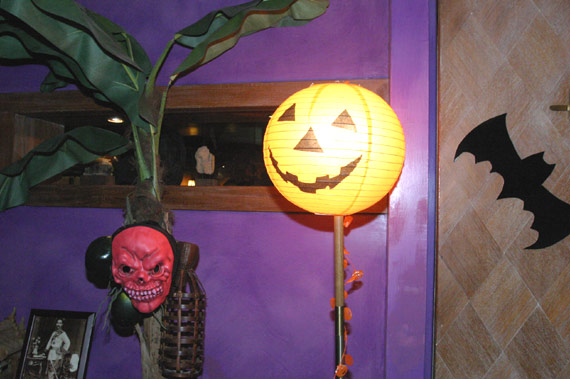
Alicia: Yes, I love it! And we have to take a golf cart!
Holly: Kinda spooky, huh? I hope nothing big jumps out at us.
Alicia: I wouldn't count on that. Brian said to expect the unexpected!
Holly: Well, it's definitely dark and creepy in here.
Alicia: Yeah, it's giving me the creeps. I keep seeing things moving out there behind the trees.
Brian: I heard that a prison escapee roams these woods!
Holly: Knock it off, Brian! You're just trying to get us screaming!
Brian: This isn't scary. But I bet you girls will scream if something jumps out!
Alicia: Brian! Something just moved up there in front of us!
Brian: Don't worry, Alicia, I'll protect you.
Holly: Keep your eyes on where you're going!
Brian: Ahh! A werewolf!
讲解:
1. Alicia,Holly 和 Brian来到了他们的朋友Jack专门为万圣节布置好的鬼森林,就是Haunted Woods. haunted这个词表示“闹鬼的,鬼魂出没的,受到折磨的”,例如:They live in a haunted house. 他们住的房子闹鬼。这个次经常出现在恐怖电影里,在万圣节当然也是必不可少的了。
2. Jack布置的这个鬼森林看起来真的很恐怖,很有节日气氛,所以holly夸他He did a great job. 当你夸奖别人做的好时,就可以用这个句型,还可以说Good job! 或者You did a good job! Alicia也非常喜欢这个鬼森林,还要坐着高尔夫球车穿越森林。Holly觉得这个鬼森林有点恐怖,她说:Kinda spooky, I hope nothing big jumps out at us. 挺恐怖的吧,我希望没有什么庞然大物会朝我们跳过来。kinda,口语的说法,就是 kind of,有一点。spooky,幽灵般的, 怪异的, 神经质的。
3. Alicia可不敢说,I wouldn't count on that. count on something,这个词组,表示依靠...指望...比如说:You can count on me. 就表示“你可以相信我。” Brian说 to expect the unexpected! 等着看一些意外的事情,the unexpected,意外的事件。下面有出现了一个表示“可怕,恐怖”这个意思的词,creepy,表示“令人毛骨悚然的”。creep是它的名词形式,原意是“蹑手蹑脚”,也可以用来表示可怕,心惊肉跳。比如我们可以说 He gave me the creeps. 他吓得我心惊肉跳。
4. Alicia觉得很害怕,说她一直看到树后面有东西跑出来。Brian这时有添油加醋地说听说有个越狱的人在这片树林里游荡。a prison escapee,越狱的犯人,roam,漫无目的地四处游荡。Holly 被吓到了,赶忙让Brian闭嘴,她是这么说的,knock it off! 表示“住口,停下来”。只要有人发出令人讨厌的声音,说了讨厌的话,做了讨厌的动作,都可以说knock it off 来让对方停止。
5. Brian就是想吓唬吓唬那两个女生。这时Alicia看到有东西在他们前面晃来晃去的,up there in front of us,在我们正前方。Brian劝她不要担心,说会保护她的。Holly提醒Brian注意看路,keep you eyes on where you're going! keep one's eyes on something/someone,注意,监视某人某物。突然什么东西撞到了他们的高尔夫球车上,也吓了Brian一跳,原来是狼人,也就是werewolf。
Dialogue Script 2 对话原文 2
Alicia: Wow! Holly! Your place is totally decked out for Halloween. It's cool!
Holly: That's because we'r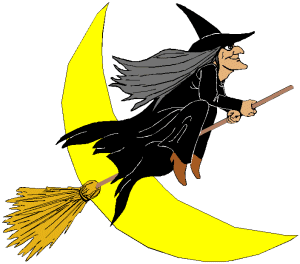 e having a party here later tonight, squirt!
e having a party here later tonight, squirt!
Alicia: Can I stay up?
Holly: We'll see! You'll probably be on a big sugar high anyway.
Alicia: Hee-hee! Yeah! I hope your neighbors give out good candy.
Holly: They will when they see what a scary witch you are. I love your fake nose and warts28.
Alicia: Dad bought them for me. And these, too. They're my slimy plastic toads29.
Holly: Ew! Uh, I think you should flash those at anyone who tries to give junk candy.
Alicia: Hah! This will be so much fun! This costume's much cooler than the pink ballerina costume mom made last year.
Holly: Yes, but you need a witch's laugh. Try this---Yihahaha!
Alicia: Or this "I'll get you, my pretty! Wahahaha!"
Holly: Sounds like you're a natural.
讲解:
1. Alicia来到Holly家参加万圣节派对,还穿上了万圣节服装。万圣节的服装是Halloween Costume,记住了,而不是clothes。costume多表示在戏剧或化妆舞会上穿的比较正式的服装,而clothes常表示普通的衣物。
2. Alicia夸赞Holly的家很有万圣节的感觉。Your place is totally decked out for Halloween. deck out,装饰,布置,deck out for something,为了某种场合而布置。Alicia问可不可以晚上不睡玩通宵呢,Holly说We’ll see! 就是再看看,还不一定。stay up,很晚才睡,熬夜,例如:Don't stay up late and wait for me. 不用熬夜等我。
3. We'll see.有两种意思,第一个时指要晚一点再看情况决定。也就是再看看。那二个意思是等着瞧,例如:---Can I stay at Jenny's house this weekend? ---We'll see. ---我这个周末可以待在珍妮家吗?---看情况再说。---Is it going to be scary? ---We'll see. ---这会很可怕吗?---等着瞧吧。
4. You'll probably be on a big sugar high anyway. 也许你会因为糖吃的太多而变得很兴奋。sugar high,吃糖引起的兴奋,美国人常认为糖吃太多人会变得比较亢奋,当然睡不着觉了。Alicia开心的笑了起来,Hee-hee!是个拟声词,相当于我们的“嘻嘻!”。Alicia希望邻居能发一些好糖。I hope your neighbors give out good candy. give out,分发,发出。
5. Holly相信邻居们看到Alicia的服装后会给她不错的糖的。Alicia装扮成了一个女巫,就是witch,那男巫师就是wizard。这两个词在Harry30 Porter等电影里都多次出现过。Holly很喜欢她的假鼻子和痣。Alicia的爸爸还给她买了一些粘粘的塑胶蟾蜍,很恶心的那种,大概是女巫的宠物吧。Holly还建议她把这些秀给那些要拿垃圾糖果给你的人。flash something at someone,亮出,闪出什么东西给别人看。劣质的糖果,这里用的是junk candy。
6. Holly还教Alicia学女巫的笑声,结果Alicia比Holly笑的还像,Sounds like you're a natural. 听起来你是天生就会了。You’re a natural.表示是做某事的天生好手。这里natural是指“天生具有某种特殊才能的人”,所以当某人对某方面天生在行,就可以用这个句子来称赞对方。
Dialogue Script 3 对话原文 3
Alicia: You know, I haven't heard from Jack before we went to the Haunted Woods. 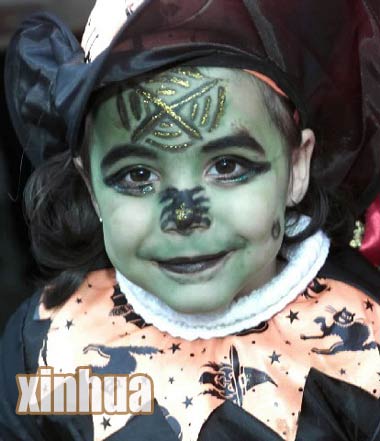
Holly: Still no sign of Jack? Maybe he's at the Village Halloween Parade!
Alicia: I just wish he'd call.
Holly: Hey, take it easy! I think we throw a great party!
Alicia: Yes, you bet. The spaghetti and hard-boiled eggs grossed people out!
Holly: And the Jell-o. I though no one would fall for that any more.
Alicia: Give it up, Brian! I saw you coming a mile away! [to Holly] Hey, isn't that the werewolf from...
Werewolf: [Jumping over to Holly] Give me your heart, baby!
Brian: Hey, you stay away from her!
Jack: What's wrong with you, dude? You look like you just saw a ghost!
Brian: Oh, Jack! I though you were...I mean, how are you? Where've you been?
Jack: Yeah, it's been a crazy week. Some idiot ran me over at the Haunted Woods. He nearly broke my leg!
Brian: [Embarrassed] Oh, that's...terrible.
讲解:
1. 对话中,Alicia很担心Jack, 因为在她们去鬼森林之前就没有见到她了,但是Jack却出现在Holly的party上。Still no sign of Jack? 还没有Jack的影子吗?Holly安慰Alicia说也许Jack去参加万圣节游行了。对话中提到了Village Halloween Parade全名是Greenwich Village Halloween Parade,Greenwich常被省略掉。格林威治村万圣节游行可以说是纽约市万圣节的重头戏,上万的市民和观光游客打扮成各式各样的人物,晚上7点在纽约第六大道上集合,接着开始游行,历时约两三个小时。
2. Alicia只是希望Jack能打电话来。Holly及时叉开了话题,I think we throw a great party! 我们办了场不错的派对!throw a party,办派对。Alicia非常同意,The spaghetti and hard-boiled eggs grossed people out!那些意大利面和煮的很老的蛋让大家快恶心死了。gross out,让人做呕。原来她们开的party是专门用来折磨客人的。 因为万圣节就是让人们尽情搞怪的节日。就像愚人节一样。她们做的搞怪食物还有Jell-o,果冻。Jell-o原来是一个果冻商标的名称,现在已经泛指“果冻”了。I though no one would fall for that any more. 我以为现在已经没有人会被这种东西骗了。看来这个果冻也不是什么好东西。fall for something,被某物欺骗,上…的当。
3. 这时Brian走过来想吓唬Alicia和Holly,但是却被Alicia识破了。Give it up, Brian! I saw you coming a mile away! 算了吧,Brian,我老远就看到你过来了。突然Alicia看见一个狼人走了过来,Brian冲出来大喊,Hey, you stay away from her! 嘿,你离她远一点,一副英雄救美的样子。
4. 原来狼人就是Jack装扮的。What's wrong with you, dude? You look like you just saw a ghost! 怎么了,老兄,你看起来像见到了鬼一样。dude, 在口语中常用,表示“家伙”,有贬义的色彩。Brian知道了原来狼人就是Jack,觉得很尴尬,原来在鬼森林里他差点撞断了狼人的腿。被Jack知道了,一定饶不了他。
Part 4 Go Trick or Treating 不给糖就捣蛋
Dialogue Script 1 对话原文 1
Kids: Trick or treat, smell our feet, give us something good to eat.
Brian: Wow! What great costumes. What are you?
Kid 1: I'm a space man. See, this is my helmet. Thanks for the candy, sir!
Kid 2: I'm a witch! I'll make you disappear if yo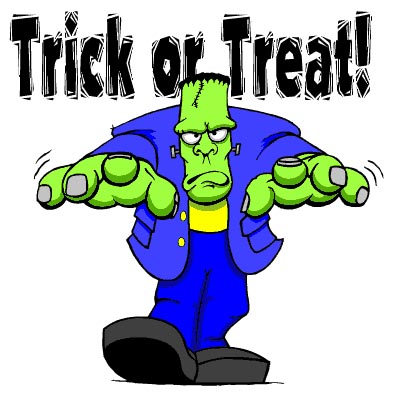 u don't give me some candy!
u don't give me some candy!
Brian: Please, good witch, don't make me disappear. Here is a bag of treat for you.
Kid 2: Oh, thank you.
Brian: Well, I won't keep you. I know you have a lot more doors to hit.
Kids: Good night!
Brian: Good night!
讲解:
1. 对话中两个小孩子来找Brian要糖,她们说,Trick or treat, smell our feet, give us something good to eat. 不给糖就捣蛋,闻闻我们的臭脚丫,拿些好东西来给我们吃。这是孩子们在玩Trick or treat 时的一句歌谣。
2. 两个小孩分别装扮成宇航员和女巫,Brian给了她们一些糖,她们才满意的离开。Brian说,I won’t keep you. I know you have a lot more doors to hit. 我就不耽误你们了,我知道你们还有还多家要走。小朋友们在万圣节的时候借着trick or treat化装成各种人物,挨家挨户讨糖吃,整晚下来每个人都收获颇丰。
Dialogue Script 2 对话原文 2
Holly: Man, Alicia, you really raked in the candy.
Alicia: And it's a lot of good stuff. Wanna see?
Holly: Well, mind if I have a candy bar? You've got like thirty.
Alicia: Well....um...I guess. Here, you can have this one. I don't like it that much.
Holly: Hah! Thanks. OK, two rules. Let an adult make sure the candy's OK before you eat it, and no more than ten pieces.
Alicia: Aw...mom always lets me eat as much as I want!
讲解:
1. 这段对话比较简单。Holly和Alicia收获颇丰,特别是Alicia收罗了一大堆糖果。you really raked in the candy. 你真的搜刮到一大堆糖果。rake in,是大量地搜刮的意思。
2. Holly向Alicia要了一根巧克力棒,并且告诉了Alicia两条规则,一个是在吃糖果之前,要先让一个成年人确认糖果没有问题,而且不能超过十个。因为曾经发生过小孩子吃了来路不明的糖果而中毒的事件,所以现在很多家长会检查小孩拿回来的糖果,确定没有什么问题了再给小朋友吃。
Part 5 How to Make a Halloween Jack-o'-Lantern 怎样制作南瓜灯
Steps:
1.Cut a large hole around the top of the pumpkin. 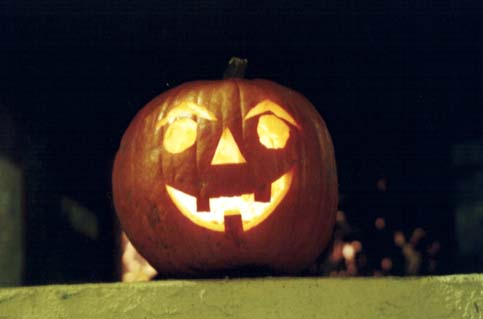
2.Put your hand inside the pumpkin and take out the seeds.
3.Draw the eyes, nose and mouth on the pumpkin.
4.Cut out the eyes, nose and mouth with a knife.
5.Your pumpkin becomes a Jack-o'-Lantern when you place a candle in it.
制作南瓜灯有下面几个步骤:
1.切割:在南瓜的顶/底端,用小刀将瓜面切除一块,以便伸手进去掏空瓜瓤。切面尽量平整。
2.掏空:用特制的勺子或日用勺子也可,将瓜籽和瓜瓤小心掏出来。选定您准备进行雕刻的地方,将那块瓜皮刮薄至1英寸厚。
3.粘贴纸脸谱:在选定处,粘上或者钉上事先准备好的纸脸谱。使用图钉时,注意钉在脸谱的虚线处,这样可以避免瓜面上出现小洞洞。
4.沿虚线描刻:沿纸脸谱的虚线边,用小锥或图钉在南瓜皮上描出脸谱。完成之后,撕下纸脸谱。
5.观看效果: 用小锥子点对点地再修正一番。最后在南瓜灯里点上蜡烛。南瓜灯就做好了。
 收听单词发音
收听单词发音
1
peculiar

|
|
| adj.古怪的,异常的;特殊的,特有的 | |
参考例句: |
|
|
|
2
demon

|
|
| n.魔鬼,恶魔 | |
参考例句: |
|
|
|
3
vestige

|
|
| n.痕迹,遗迹,残余 | |
参考例句: |
|
|
|
4
Christian

|
|
| adj.基督教徒的;n.基督教徒 | |
参考例句: |
|
|
|
5
corruption

|
|
| n.腐败,堕落,贪污 | |
参考例句: |
|
|
|
6
possessed

|
|
| adj.疯狂的;拥有的,占有的 | |
参考例句: |
|
|
|
7
undesirable

|
|
| adj.不受欢迎的,不良的,不合意的,讨厌的;n.不受欢迎的人,不良分子 | |
参考例句: |
|
|
|
8
debunk

|
|
| v.揭穿真相,暴露 | |
参考例句: |
|
|
|
9
waned

|
|
| v.衰落( wane的过去式和过去分词 );(月)亏;变小;变暗淡 | |
参考例句: |
|
|
|
10
dressing

|
|
| n.(食物)调料;包扎伤口的用品,敷料 | |
参考例句: |
|
|
|
11
pranks

|
|
| n.玩笑,恶作剧( prank的名词复数 ) | |
参考例句: |
|
|
|
12
skulls

|
|
| 颅骨( skull的名词复数 ); 脑袋; 脑子; 脑瓜 | |
参考例句: |
|
|
|
13
Christians

|
|
| n.基督教徒( Christian的名词复数 ) | |
参考例句: |
|
|
|
14
donors

|
|
| n.捐赠者( donor的名词复数 );献血者;捐血者;器官捐献者 | |
参考例句: |
|
|
|
15
limbo

|
|
| n.地狱的边缘;监狱 | |
参考例句: |
|
|
|
16
jack

|
|
| n.插座,千斤顶,男人;v.抬起,提醒,扛举;n.(Jake)杰克 | |
参考例句: |
|
|
|
17
folklore

|
|
| n.民间信仰,民间传说,民俗 | |
参考例句: |
|
|
|
18
tempt

|
|
| vt.引诱,勾引,吸引,引起…的兴趣 | |
参考例句: |
|
|
|
19
frigid

|
|
| adj.寒冷的,凛冽的;冷淡的;拘禁的 | |
参考例句: |
|
|
|
20
turnip

|
|
| n.萝卜,芜菁 | |
参考例句: |
|
|
|
21
turnips

|
|
| 芜青( turnip的名词复数 ); 芜菁块根; 芜菁甘蓝块根; 怀表 | |
参考例句: |
|
|
|
22
pumpkin

|
|
| n.南瓜 | |
参考例句: |
|
|
|
23
pumpkins

|
|
| n.南瓜( pumpkin的名词复数 );南瓜的果肉,南瓜囊 | |
参考例句: |
|
|
|
24
plentiful

|
|
| adj.富裕的,丰富的 | |
参考例句: |
|
|
|
25
cults

|
|
| n.迷信( cult的名词复数 );狂热的崇拜;(有极端宗教信仰的)异教团体 | |
参考例句: |
|
|
|
26
carving

|
|
| n.雕刻品,雕花 | |
参考例句: |
|
|
|
27
holly

|
|
| n.[植]冬青属灌木 | |
参考例句: |
|
|
|
28
warts

|
|
| n.疣( wart的名词复数 );肉赘;树瘤;缺点 | |
参考例句: |
|
|
|
29
toads

|
|
| n.蟾蜍,癞蛤蟆( toad的名词复数 ) | |
参考例句: |
|
|
|
30
harry

|
|
| vt.掠夺,蹂躏,使苦恼 | |
参考例句: |
|
|
|

















